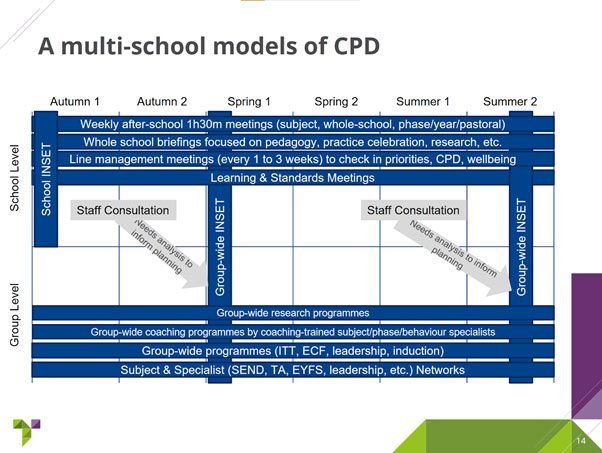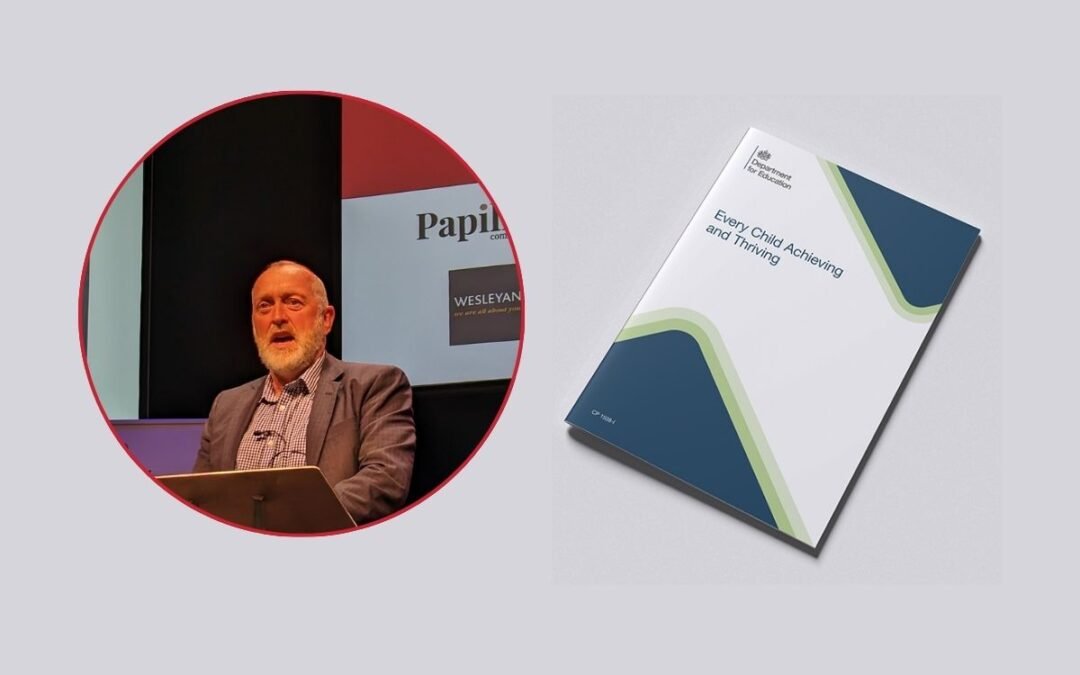 By David Weston
By David Weston
Teacher Development Trust
One of the key benefits of being part of an academy trust is the ability to ensure teachers and leaders have high quality professional development, based on the very best thinking and drawing upon the expertise of the whole group (and beyond). What does this look like in practice? Here, David Weston – CEO of our partners at the Teacher Development Trust – explores the opportunities and potential barriers to effective trust-wide CPD in more detail.
Trusts frequently struggle to balance competing layers of priorities. When it comes to CPD, a central offer needs to make sense at all levels: from whole Trust, through individual schools, their teams and their individual staff. And any central offer needs to be complemented by development offered at school level, at team level and for various career pathways. It also needs to inform choices made about the commissioning of external courses – will these be aligned with Trust and school views on quality and priority?

We have worked with a number of Trusts who have, initially, struggled with these seemingly challenging priorities. What we’re now seeing are emerging structures that connect each level and really unleash the benefits that Trusts can bring.
I’m going to lay out an example model. This should by no means be seen as some sort of ideal – it wouldn’t work in every Trust and there are alternative approaches. But it illustrates how different pieces of the puzzle interact with each other. The following slide is taken from a series of talks I’ve been giving to Trust leaders.

It’s best to start at the top of this diagram, at the school level. Each school, in this idealised structure, ensures that there is dedicated weekly time for teachers and teaching assistants to meet to discuss key specialist areas. For small schools this might always be a whole staff team event but more likely this will be split into phases and subjects at least some of the time. Secondary schools sometimes find it helpful to also have pastoral-focused sessions looking at year groups, houses and/or tutor groups.
“What we’re now seeing are emerging structures that connect each level and really unleash the benefits that Trusts can bring.” David Weston
This rhythm of meetings then connects to the weekly briefings. Rather than being administrative, these are regular moments to share and celebrate progress being made, ensure that people know about the learning and development taking place around the organisation, and ensure that it is repeatedly demonstrated how important professional learning is.
Meetings are helpful, but the only way that the work is really embedded is to ensure that all staff have regular line management meetings. Some schools manage these as much as weekly, while others go for a couple of times per half term. Either way, line managers should always ensure they’re triangulating key areas: what are your challenges in your practice (e.g. specific pupils and topics), what are your aims (in your practice and your career) and what are you learning about or studying at the moment? Line managers should identify where these are not aligned and also keep asking coaching questions about impact – how will you know if this is working and how will you design in formative assessment to explore and reveal the impact? Line managers should also check in on wellbeing, workload and listen out for issues that need nipping in the bud, or successes that can be celebrated more widely.
A fourth key school-level mechanism is Learning and Standards meetings, sometimes known as Progress Review Meetings. More common in primary, currently, these are regular review meetings where teachers and TA’s discuss with line managers and peers how effectively their pupils are learning, how they’re attending to this and adapting their practice and – crucially – how this relates to the CPD and support that they’re getting.
Schools with all of these mechanisms will already have improvement momentum, but this can be enormously amplified if this links to Trust-level plans.
Specialist, cross-school groups and networks ensure that each topic and subject is taught with the collective expertise of the whole Trust. There should be a network for every subject, with subject co-ordinators and leads and space for teachers to attend as well. These need to be expertly led and facilitated, ensuring agendas stay relevant, take-aways are practical and that they meet the needs of all attendees, pitching neither too low nor too high in terms of knowledge and expectations.
“Speicalist, cross-school groups and networks ensure that each topic and subject is taught with the collective expertise of the whole Trust.” David Weston
Trusts are now often running programmes that span schools, including programmes of ITT, early career induction and leadership training. In many cases there are common induction programmes that induct staff into the trust values and ethos and support available – this can reduce pressure on individual schools to direct this crucial element of practice for every new staff member.
Trusts are now frequently creating research groups that span schools. This allows staff to choose a focus of research or enquiry that is not only relevant to their school and team/phase aims but also which can be supported by a high level expert instead of being poorly-resourced in a single institution. It fosters cross-school collaboration and can both bring in and spread around excellent practice, when carefully structured and supported.
Finally, cross-Trust coaching is an enormous opportunity. Many trusts are identifying and training their very best subject experts and specialists to become Lead Practitioners and coaches who can be called upon by any teacher (or TA) in any school to give them specific feedback. There may be specialisms in maths, SEND, science or it could be even more granular – specialist coaches in ADHD, trigonometry and human biology. This is both an enormous asset to the Trust for pedagogy and curriculum development but also an exciting opportunity for staff across the Trust to work toward being recognised experts in their fields.
This can all be brought together by finding common times for schools across the Trust to meet together. Whole-Trust INSET days have, historically, often been moments that Trust Exec teams love but staff on the ground see little relevance. In this model, each joint INSET has sessions where individual networks, groups and programmes have timetabled slots to collaborate and share. This creates a rhythm where cross-school work is connected cross-Trust on a regular basis. Of course, there can and should also be virtual opportunities to do so as well, especially with the much greater confidence that all staff have working in this way.
Finally, even the best intended structure won’t be received well unless staff have regular opportunities to feed back on what they want to see at school and Trust level and on joint INSET days, and for them to see that this feedback is having an impact – they want to feel heard. Staff views on access to, and the quality of, professional development should form a key part of any staff survey – and these perceptions should be monitored for key trends year on year by the executive and its board.
All of these lessons come from work that my colleagues and I have been undertaking with many Trusts and Trust leaders. Conducting reviews, training and coaching of leaders across Trusts and regions has shown us that although the above model may look very difficult to achieve, every Trust is able to make amazing progress toward these sorts of powerful, collaborative models with the right support. If you’d like to find out more then please do get in touch with me and we can put you in touch with our experts and support your ongoing journey to be a Trust that has learning, development and shared expertise as its heart.

David Weston
David.Weston@TDTrust.org
Find out more: Trusts and Groups – Teacher Development Trust (tdtrust.org)
This article is from Teacher Development Trust who are commercial partners to Forum Strategy as part of a ‘paid-for partnership’ they have with us. In selecting our partners, we do so with strong reference to their expertise in their field and their commitment to Forum Strategy’s values and ethos.


